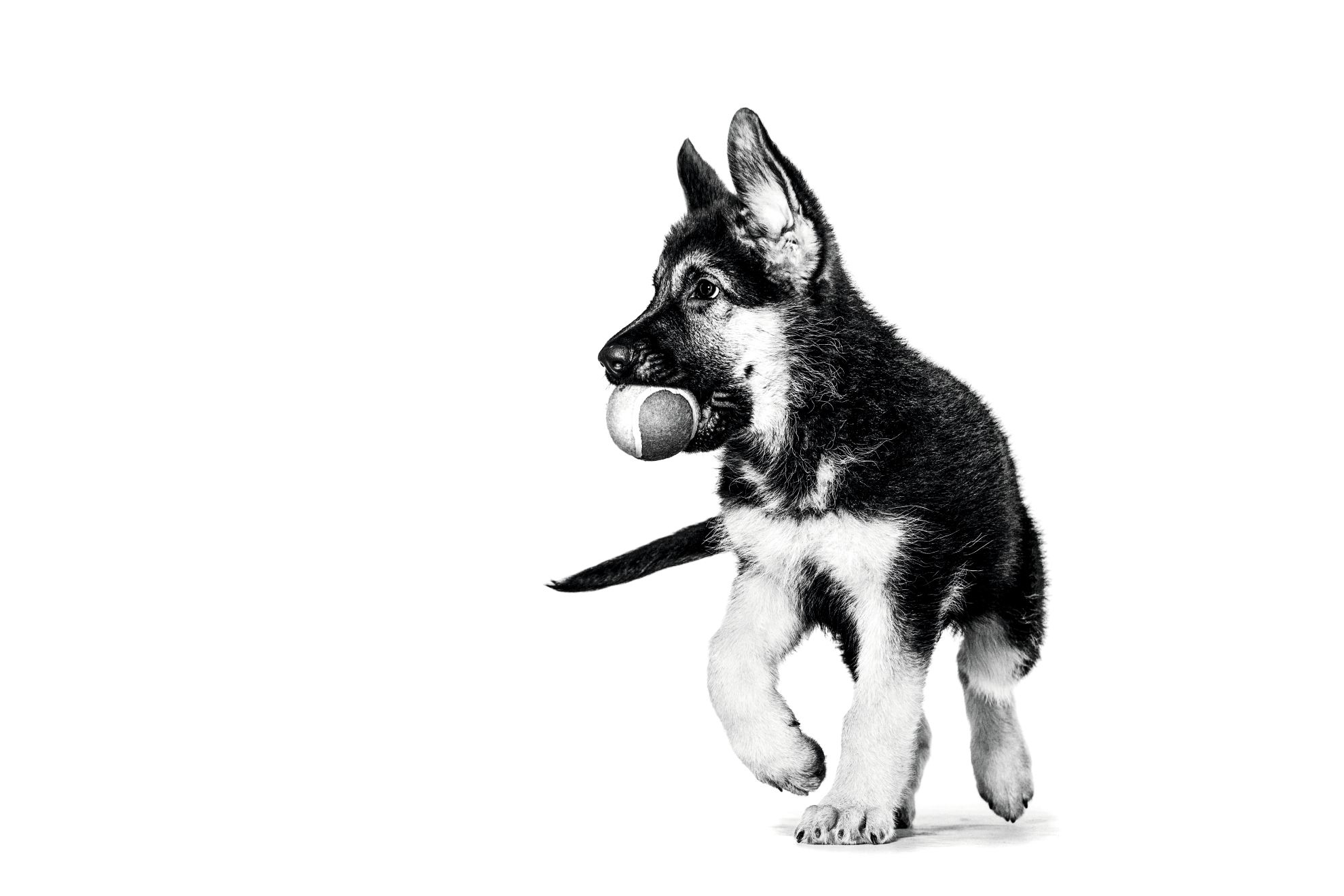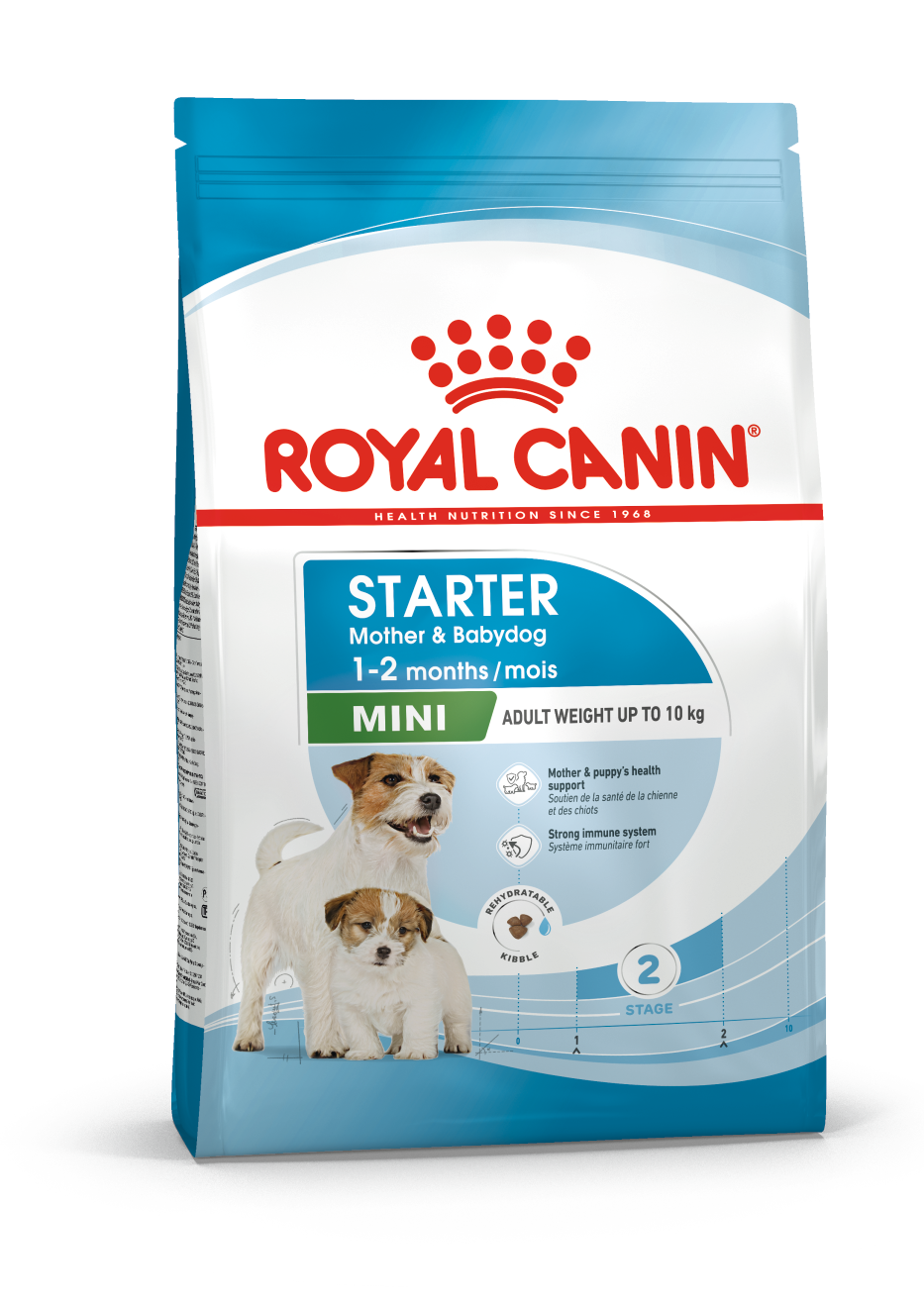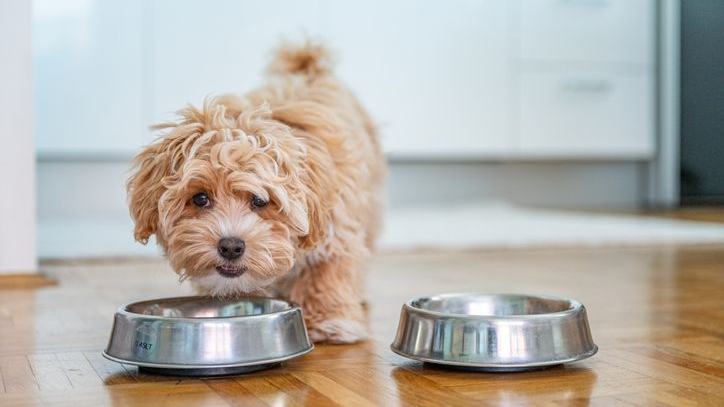
Discover our Puppy Growth Programme
In the blink of an eye, your puppy seems to transform from a helpless newborn, dependent on their mother, to a clumsy dog exploring every nook and cranny and, finally, into canine adulthood. That rapid growth requires special nutritional support to lay a solid foundation for your dog’s health as an adult.
Understanding each phase of a growing puppy’s development will help you support your pet’s optimal good health all along the way. Puppy growth charts are a great tool. They can give you a heads-up on when to expect those puppy growth spurts. A healthy puppy should be provided with all the essential nutrients and nutrition. This will allow their rapidly developing body to have a better chance of becoming a healthy adult dog.
On this page, you will find the following:
1. Spotlight on puppy growth stages
Your puppy goes through several growth stages as they transition from puppyhood to adulthood. Small breeds reach adult size in their first year whereas certain larger breeds can take up to 18-24 months to grow into their adult size. Each major stage of your puppy’s life requires different nutrients to support physical and cognitive development. For example, a newborn puppy needs different nutritional support than an eight-week-old or 24-week-old puppy.
Follow your puppy’s development week by week to see what’s happening inside their rambunctious body. Learn what you need to take into consideration when selecting the foods that provide your puppy's nutritional support at each life stage.
“A newborn puppy needs different nutritional support than an eight-week-old or 24-week-old puppy.”
Puppy growth stages. What can you expect as your puppy grows?
Each stage of your puppy’s journey has different growth and behaviour milestones. Here’s an overview of what to expect at each key stage of your dog’s puppyhood.
Newborn
Birth to 3 weeks
That newborn puppy is defenceless but quickly becomes a 3-week-old with a budding personality! While they may be getting a lot of sleep during this period, this is an important developmental stage. The key nutritional support will be their mother’s milk.
Our Puppy Growth Programme nutritional recommendations
Our products are designed to accompany your puppy’s growth, helping provide meaningful benefits thanks to specifically chosen nutrients for each stage of life.
Babydog Milk
Socialisation and early growth
From 3 weeks to 2 months
Your puppy will start to take bigger strides during this intense developmental stage. For this, they will need to increase their calories and up their nutrients. They will start being weaned from their mother at 4 weeks old. Around the eight-week mark, your puppy will have their first vet visit to receive their vaccinations and start building their immune system.
Our Puppy Growth Programme nutritional recommendations
Our products are designed to accompany your puppy’s growth, helping provide meaningful benefits thanks to specifically chosen nutrients for each stage of life.

Mother & Babydog
From 1 to 2 months old
Juvenile and adolescent
From 2 months to adulthood
Once your puppy has been properly weaned and moved into your home, their diet should remain constant throughout this crucial phase. This is an important moment for bone and muscular development, therefore a diet with the optimal balance of calcium and phosphorus is key. After 6 months of age, some puppies may look like adult dogs but they still need a few more months of growth for their bodies to fully mature.
Our Puppy Growth Programme nutritional recommendations
Our products are designed to accompany your puppy’s growth, helping provide meaningful benefits thanks to specifically chosen nutrients for each stage of life.
Puppy
From 2 to 10 months for Extra-Small and Small dogs,
12 months for Medium breeds, 15 months for Large breeds
and 8 months for Giant breeds
Giant dog consolidation phase
From 8 months to adulthood
Giant dog breeds have a very specific growing pattern. Over the first two years, their body size will multiply by nearly 100%. After the first rapid growth phase, they need an appropriate, adapted Junior dog diet to support their slower but extended growth period, making sure bones and muscles grow together harmoniously.
Our Puppy Growth Programme nutritional recommendations
Our products are designed to accompany your puppy’s growth, helping provide meaningful benefits thanks to specifically chosen nutrients for each stage of life.
Giant Junior
For Giant dog breeds from 8 months to 18 to 24 months
2. The four health pillars of raising your puppy
Immune system
- While their body grows rapidly, a puppy’s immune system develops at a much slower rate. It is your responsibility to ensure that their diet includes the correct nutritional support for their evolving immune system.
Microbiome support
- A puppy’s digestive system is sensitive. The microbiota—microorganisms found in environments like the digestive system—in your puppy’s gut play an important role in their overall health. To support their developing digestive system, your puppy needs a diet that encourages the good bacteria and keeps the bad bacteria away.
Brain development
- Your puppy’s brain is developing at an incredible pace. As a pet parent, make sure that your puppy has access to food made just for them. During this rapid and complex phase your puppy needs proper nutrients to support their evolving brain, vision, and nervous systems.
Weight management
- Good eating habits are key to weight management. Your puppy’s diet should satisfy their appetite and provide the proper nutrients and energy they need for growth without excess calories. A puppy with a healthy weight has a better chance of maintaining their weight as an adult dog.
Do you know what is the most adapted food for your puppy?

3. Thinking about mixed feeding? What is it and are there benefits?
Mixed feeding means providing both puppy dry food and wet food and is beneficial to dogs at any age. Puppies start on their mother’s milk or ROYAL CANIN® Babydog Milk before transitioning to softer babydog food. As their digestive systems are delicate at this early stage, they need food that breaks down easily.
- Variety in each bowl. A combination of wet and dry foods offers more variety. You have a growing puppy on your hands after all, so why not make feeding time an exciting experience for their nose and taste buds
- Best of both worlds. A combination of wet and dry foods also offers the best of both nutritional worlds. Wet food will help make sure that your puppy stays hydrated as it ups their water consumption. Dry food plays a role in helping to keep your puppy’s teeth clean
- Fussy eater? If you happen to have a fussy canine on your hands, mixed feeding can help with persuading them to eat what they need at mealtimes
Royal Canin puppy foods include both wet and dry formulas that are tailored to your pet’s nutritional needs at each growth stage.
Our Research and Development centres work hand in hand with veterinarians to develop tailored nutrition to meet the unique needs of every puppy
Dozens of breeders give us feedback, to help ensure excellent nutritional benefits
Taste-tested by hundreds of puppies worldwide